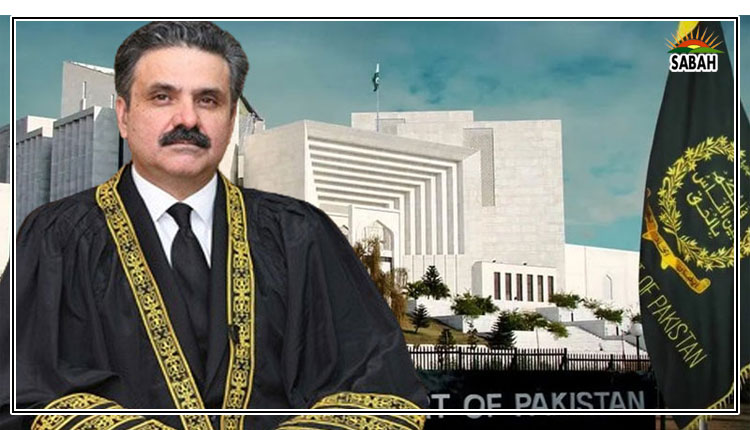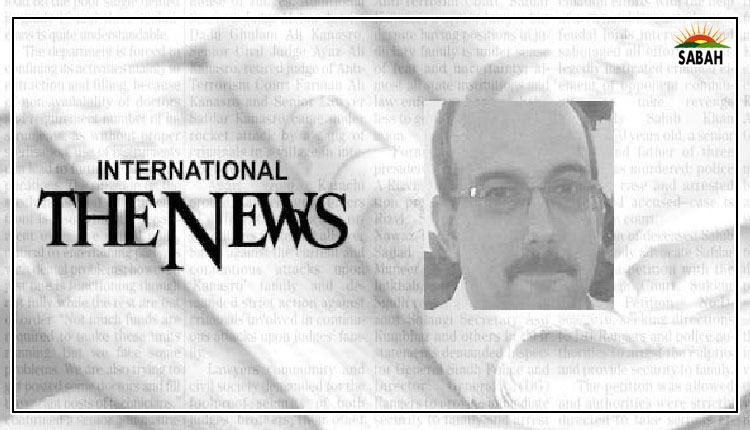The 19th Amendment … Dr Naazir Mahmood
The 19 Amendment to the constitution of Pakistan was passed in December 2010; it reformed the procedure for judicial appointments and also expanded the federally administered tribal areas (FATA). Understanding the 19th Amendment calls for an appraisal of the then chief justice of Pakistan (CJP) Iftikhar Muhammad Chaudhry and the legacy he left.
The late General Musharraf had removed Justice Chaudhry for the second time in Nov 2007 and installed Justice AH Dogar as the new CJP. After the assassination of Benazir Bhutto in December 2007, the PPP won the 2008 general elections and formed its government in March with Yousuf Raza Gilani as prime minister. By that time, CJP Justice Dogar was perfectly in saddle and despite demands by the PML-N and the lawyers community, the PPP government was reluctant to remove him and restore Justice Iftikhar Chaudhry. After the PML-N launched a long march, the then president Zardari restored Justice Chaudhry. This order was effective after Justice Dogars superannuation in March 2009.
Justice Iftikhar Chaudhry duly resumed charge in March 2009 but was not entirely happy with the PPP governments reluctance to restore him. His credentials were not impeccable as he had taken oath of allegiance to the military dictatorship of General Musharraf in 2000 and was part of at least four pivotal Supreme Court benches between 2000 and 2005; he voted with the majority of judges to appease Gen Musharraf. He validated the military takeover by the army chief, his referendum, his legal framework order (LFO) and the 17th Amendment that granted Gen Musharraf additional powers and also allowed him to continue as both army chief and president.
From March 2009 onwards, Justice Chaudhry was an assertive CJP who took umbrage at the 18th Amendments provisions for the appointment of judges. The 18th Amendment provided for an independent judicial commission to recommend the appointments of superior judges while a parliamentary committee had powers to decide the final names of judges. The 18th Amendment had reshaped the constitution with consensus, but CJP Chaudhry ordered parliament to change the articles related to the appointments of the superior judiciary. The PPP government could have opted for a confrontational path but preferred not to do so.
The same Parliamentary Committee on Constitutional Reforms that Senator Raza Rabbani chaired drafted the 19th Amendment and increased the number of senior-most judges from two to four in the Judicial Commission of Pakistan. The tribal areas adjoining the Lakki Marwat and Tank districts became part of Fata, and the High Court of Islamabad received a new nomenclature Islamabad High Court. The most significant alteration was in Article 175-A which binds the parliamentary committee to justify its decision if it rejects any nominee of the Judicial Commission for the appointment of judges.
The 19th Amendment also included the prime minister in the appointment procedure of judges as the parliamentary committee shall send the names of the nominees that it confirmed to the PM who shall forward it to the president. A committee meeting could take place only in camera and it had to maintain a formal record of its proceedings. Now the parliamentary committee and not parliament could discuss and consider the conduct of judges. The committee, to a great extent, followed the directions of the Supreme Court that had ordered amendments in certain clauses of the constitution.
This was also a landmark achievement of the PPP government which dispelled the fears of confrontation among state institutions. In 2010, parliament crossed two major milestones by approving the 18th and 19th Amendments both with wide deliberations and near consensus, also in compliance with the Supreme Court order. Now the Judicial Commission had the CJP with four serving and one retired judge, in addition to the federal law minister, the attorney general and a representative of the Pakistan Bar Council (PBC). It also specifies 15 years experience for the PBC representative.
If the parliamentary committee once rejects a nomination it has to give reasons, and the judicial commission cannot resend the same nomination. The amendment also increased the number of parliamentary committee members for the appointment of the chief election commissioner to 12. If we look at the current situation in the Supreme Court, we need to recall that the 19th Amendment had clearly specified that the chief justice of the Supreme Court would make recommendations for the appointment of ad hoc judges in the superior courts in consultation with the judicial commission.
Perhaps the 19th Amendment was the only amendment in the constitution that a chief justice imposed on parliament and that was indeed the beginning of the individualism we see today in the SC. The approval of the 19th Amendment was a victory for CJP Iftikhar Chaudhry who had managed to arm-twist parliament to get the maximum power that he wanted, and now we witness it being used as a tool to impose ones unbridled discretion.
Right after the passing of the 19th Amendment, CJP Chaudhry formulated the rules of the Judicial Commission of Pakistan (JCP); the most devastating was Rule 3. By imposing the amendment, he managed to gain a majority of judges in the JCP, making a six-judge majority in the nine-member commission. Rule 3 of the Judicial Commission empowered the chief justice to make nominations which the commission could assess and confirm or reject. The purpose of the 18th and 19th amendments was to forestall any misuse of personal discretion, but under Rule 3 the CJP arrogated to his office the authority to initiate nominations. Ideally, such powers needed dilution by empowering other members of the commission to have a say in nominating a judge whom they consider suitable for elevation to the Supreme Court.
It is true that in the US, the president in his individual capacity nominates a judge for appointment to the Supreme Court and then the Senate has the powers for confirmation. But in the US, the Supreme Court has never sent an elected head of government packing as happened in Pakistan when CJP Chaudhry forced the removal of former minister Yusuf Raza Gilani in 2012 for not complying with his orders.
This is why there is now a need for constituting a joint parliamentary committee on judicial reforms through new and more effective legislation. As mentioned earlier, the Charter of Democracy that Benazir Bhutto and Nawaz Sharif signed in 2006 contributed to the 18th Amendment. But through the 19th Amendment and then with his unilateral Rules of the Judicial Commission CJP Chaudhry went against the grain of checks and balances, pushing for maximum power concentration in his own hands. This power concentration has spawned multiple decisions of the superior judiciary that lack transparency and do not reflect responsible behaviour. Certain issues related to the formation of court benches and suo-motu notices have been haunting the nation since then.
The same concentration of power that emanated due to a diversion from the 18th Amendment and resulted in the 19th Amendment with controversial JCP rules has also been manifested in the refusal to set up full-court benches for hearing important cases that have far-reaching impact on the political system of the country. Now one institution is able to pressurize others without assigning any reason at the sole behest of the decision-maker.
The formation of a full-court bench becomes even more vital when the judiciary is about to decide matters related to another organ of the state. The 19th Amendment was a desperate attempt by parliament to safeguard the 18th Amendment that Justice Chaudhry could have declared against the basic structure of the constitution and the PPP government did not want to jeopardize its efforts by inviting the wrath of the CJP.
The writer holds a PhD from the University of Birmingham, UK.
He tweets @NaazirMahmood and can be reached at:
mnazir1964@yahoo.co.uk
Courtesy The News












